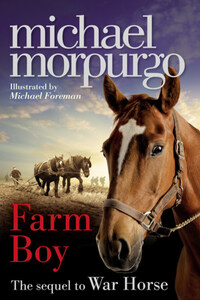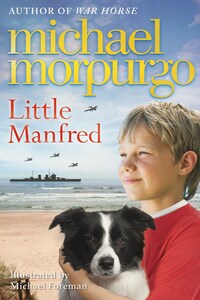I first read Grandma’s letter over ten years ago, when I was twelve. It was the kind of letter you don’t forget. I remember I read it over and over again to be sure I’d understood it right. Soon everyone else at home had read it too.
“Well, I’m gobsmacked,” my father said.
“She’s unbelievable,” said my mother.
Grandma rang up later that evening. “Boowie? Is that you, dear? It’s Grandma here.”
It was Grandma who had first called me Boowie. Apparently Boowie was the first “word” she ever heard me speak. My real name is Michael, but she’s never called me that.
“You’ve read it then?” she went on.
“Yes, Grandma. Is it true – all of it?”
“Of course it is,” she said, with a distant echoing chuckle. “Blame it on the cat if you like, Boowie. But remember one thing, dear: only dead fish swim with the flow, and I’m not a dead fish yet, not by a long chalk.”
So it was true, all of it. She’d really gone and done it. I felt like whooping and cheering, like jumping up and down for joy. But everyone else still looked as if they were in a state of shock. All day, aunties and uncles and cousins had been turning up and there’d been lots of tutting and shaking of heads and mutterings.
“What does she think she’s doing?”
“And at her age!”
“Grandpa’s only been dead a few months.”
“Barely cold in his grave.”
And, to be fair, Grandpa had only been dead a few months: five months and two weeks to be precise.
It had rained cats and dogs all through the funeral service, so loud you could hardly hear the organ sometimes. I remember some baby began crying and had to be taken out. I sat next to Grandma in the front pew, right beside the coffin. Grandma’s hand was trembling, and when I looked up at her she smiled and squeezed my arm to tell me she was all right. But I knew she wasn’t, so I held her hand. Afterwards we walked down the aisle together behind the coffin, holding on tightly to one another.
Then we were standing under her umbrella by the graveside and watching them lower the coffin, the vicar’s words whipped away by the wind before they could ever be heard. I remember I tried hard to feel sad, but I couldn’t, and not because I didn’t love Grandpa. I did. But he had been ill with multiple sclerosis for ten years or more, and that was most of my life. So I’d never felt I’d known him that well. When I was little he’d sit by my bed and read stories to me. Later I did the same for him. Sometimes it was all he could do to smile. In the end, when he was really bad, Grandma had to do almost everything for him. She even had to interpret what he was trying to say to me because I couldn’t understand any more. In the last few holidays I spent down at Slapton I could see the suffering in his eyes. He hated being the way he was, and he hated me seeing the way he was too. So when I heard he’d died I was sad for Grandma, of course – they’d been married for over forty years. But in a way I was glad it was finished, for her and for him.
After the burial was over we walked back together along the lane to the pub for the wake, Grandma still clutching my hand. I didn’t feel I should say anything to her in case I disturbed her thoughts. So I left her alone.
We were walking under the bridge, the pub already in sight, when she spoke at last. “He’s out of it now, Boowie,” she said, “and out of that wheelchair too. God, how he hated that wheelchair. He’ll be happy again now. You should’ve seen him before, Boowie. You should have known him like I knew him. Strapping great fellow he was, and gentle too, always kind. He tried to stay kind, right to the end. We used to laugh in the early days – how we used to laugh. That was the worst of it in a way; he just stopped laughing a long time ago, when he first got ill. That’s why I always loved having you to stay, Boowie. You reminded me of how he had been when he was young. You were always laughing, just like he used to in the old days, and that made me feel good. It made Grandpa feel good too. I know it did.”














